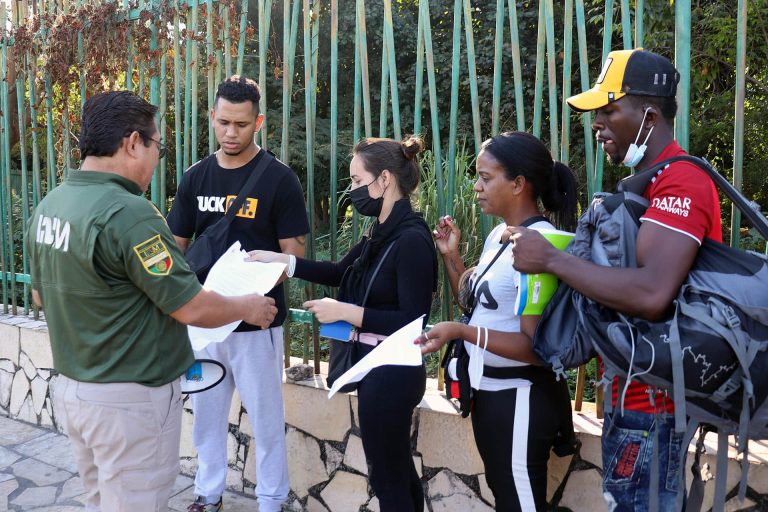10 de enero 2023

“NicaraguAmor” Cultural Caravan for Nicaraguans in the USA

PUBLICIDAD 1M
PUBLICIDAD 4D
PUBLICIDAD 5D
Sponsors will answer for the beneficiaries before the United States government, during the two years established by the “humanitarian parole.”

Migrants line up in front of the National Migration Institute (INM) to regularize their immigration status in Mexico. Photo: EFE / Juan Manuel Blanco
United States citizens or residents who become sponsors of Nicaraguan and other migrants, who adhere to the “humanitarian parole” program, will assume a “big commitment” before the US Government, since they will “answer to” the immigration authorities of this country for the beneficiaries during the two-year stay established by the US.
“The person who assumes the sponsorship must be aware of the responsibilities that this implies. It is not to be taken lightly, because anything the beneficiary does in the United States will have repercussions for the sponsor. We are talking about bad behavior,” warned Lorena Perez, a lawyer expert on immigration issues, in a broadcast done on the Facebook page of the Texas-Nicaraguan Community Initiative.
The expert explained that this does not mean that the sponsor will pay for the “mistakes” made by the beneficiary but will be the one the authorities will look for to find out or know what has happened to the migrant. Likewise, he/she must help the beneficiary in the process of adapting to the country.
“A sponsor is almost like one’s father or mother (…), but your father will not be arrested for the mistakes you made. It is you who will have the benefits severed, it is you who will be imprisoned. The sponsor is the one who is going to stand for you, but you are the one who will pay the consequences,” noted the expert.
She detailed that migrants could lose their benefits if they commit any crime such as: drug use, drinking alcohol on the street, carrying liquor in their vehicles or driving while intoxicated.
“All these crimes, perhaps, for a person in Nicaragua will not be seen (as serious), but here (in the United States) they are a major crime, such as drunk driving,” she commented.
The official document —which describes the “Temporary Stay for Cubans, Haitians, Nicaraguans and Venezuelans” process— establishes that the sponsor agrees to provide safe and adequate housing for the migrant during the two years of the program.
However, Perez explained that this does not mean that the beneficiary must live under the same roof and depend on the sponsor all the time, although she recommended “not to lose contact,” since the immigration authorities will go to him/her if something happens to the migrant.
The expert recommended that whoever presents himself/herself as a sponsor should be a citizen or already have a Green Card, so that he/she will not have problems in the selection criteria as guardian, because US authorities will make a thorough scrutiny of his/her background and income.
The measures announced by President Joe Biden establish that each month the United States will receive up to 30,000 citizens from Nicaragua, Venezuela, Cuba, and Haiti, who will be able to work for two years through the Temporary Stay Permit, known in English as “humanitarian parole.” Meanwhile, those who arrive illegally will be returned to Mexico.
The application to the program must be initiated by the sponsor, who must demonstrate, among other things, that he/she has the financial means to respond for the migrant. For this purpose, he/she may present his/her last year’s tax return and the last four receipts of payment. There is no specific amount because it will depend on the number of people who depend on him/her and the city where he/she lives.
In the case of the beneficiary, he/she will have to demonstrate that he/she is trying to migrate to the United States for reasons that do not allow him/her to stay in Nicaragua. These can be economic, mortal danger or imprisonment. Once in the United States, this person could apply for asylum for a longer period of time.
“What is understood is that they will come with a “humanitarian parole” and in the meantime they will do whatever process they have to do: an asylum process, deportation defense or protection under the convention against torture,” explained Perez.
The CBP One mobile app was created in 2022 by Customs and Border Protection (CBP) as a portal for travelers entering by land to submit their information in advance; for carriers to make an appointment for cargo inspection, among others. Now it will be used to complete the processing of this program. Therefore, you will need to:
This article was originally published in Spanish in Confidencial and translated by Havana Times
PUBLICIDAD 3M
Confidencial es un diario digital nicaragüense, de formato multimedia, fundado por Carlos F. Chamorro en junio de 1996. Inició como un semanario impreso y hoy es un medio de referencia regional con información, análisis, entrevistas, perfiles, reportajes e investigaciones sobre Nicaragua, informando desde el exilio por la persecución política de la dictadura de Daniel Ortega y Rosario Murillo.
PUBLICIDAD 3D